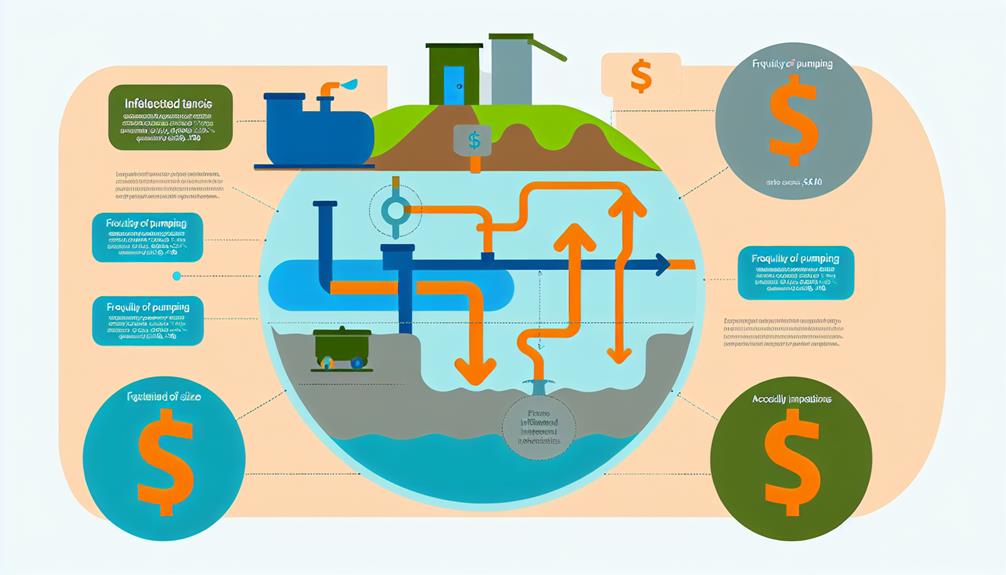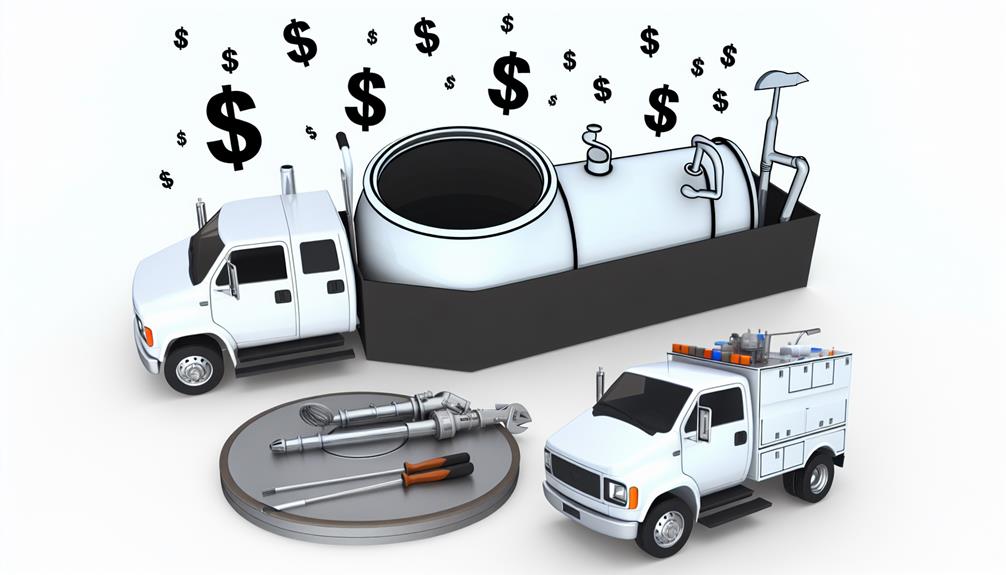Discover how to protect your septic system from breakdown with...
Read MoreYou & Your Septic Tank
Understanding the Costs of Professional Septic Tank Pumping
Our professional septic service team offers comprehensive septic tank pumping services to keep your system running smoothly. Get a FREE Quote Today.

Understanding the Costs of Professional Septic Tank Pumping
Just as navigating a ship through stormy seas requires a clear understanding of the journey’s hidden costs, so does managing your home’s septic system.
You’re probably aware that septic tank pumping is a necessary part of homeownership, but do you really understand the associated costs? They’re not always as straightforward as you might think.
From the size and complexity of your system to your location and the frequency of maintenance, several factors can influence the final bill.
Let’s set sail on this topic, and who knows, you just might find some ways to keep your costs from going overboard.
Key Takeaways
- Tank size, condition, and geographical location are key factors that influence septic tank pumping costs.
- Residential properties typically pay between $200 and $500 for professional pumping, while commercial properties have larger systems and higher pumping costs.
- Regular maintenance can help lower service charges and prevent costly repairs.
- Regular pumping is essential to maintain the longevity and functionality of the system, prevent environmental contamination, and avoid health risks.
Factors Influencing Septic Tank Pumping Costs

Several factors can significantly influence the cost of your septic tank pumping. These factors include the tank’s size, its overall condition, and the geographical location of your property.
The size of the tank is an important factor to consider. Larger tanks require more labor and time to pump, resulting in a higher cost. Additionally, if your septic tank is in poor condition, extra work may be needed to ensure it functions properly. This could involve repairing or replacing parts, which will add to the overall cost. Regular maintenance of your septic tank can help prevent these unexpected expenses.
Regional price variations also play a crucial role in determining the cost. If you’re located in an area where service providers are scarce, you may find that the cost of pumping your septic tank is higher. This is due to the lack of competition and possibly the increased travel time for the service provider. On the other hand, in areas with a high concentration of service providers, competition can drive down prices.
Average Price Ranges for Septic Tank Pumping
Understanding the average price ranges for septic tank pumping can help you budget appropriately and avoid any unexpected costs. Pumping frequency and the distinction between residential versus commercial costs are two key factors that significantly influence these ranges.
Generally, for a residential property, you can expect to pay between $200 and $500 for a professional septic tank cleaning, with the average cost sitting around $375. It’s important to note that this cost can fluctuate depending on the pumping frequency. More regular pumping, say every one or two years, might lead to lower individual costs due to less labor and waste removal.
Commercial properties, on the other hand, often have larger septic systems to accommodate higher usage volumes. Therefore, they tend to have higher pumping costs, often ranging from $500 to $1,200 or more. Again, the frequency of pumping can impact these costs, with regular maintenance potentially lowering individual service charges.
Hidden Costs of Septic Tank Maintenance

Beyond the standard pumping costs, you might encounter additional hidden expenses related to septic tank maintenance. These costs are often overlooked but can significantly impact your budget if not accounted for.
- Maintenance Frequency: The recommended frequency for septic tank pumping is every three to five years, depending on usage. However, more frequent maintenance might be required if your system is older or if it’s used heavily. This could increase your annual expenses.
- DIY Risks: While it’s tempting to try and save money by performing maintenance tasks yourself, there are significant risks involved. Improper handling can lead to more damage, resulting in higher repair costs down the line. Not to mention, there’s also the potential cost of personal injury.
- Incidental Repairs: Over time, parts of your septic system may need repair or replacement. Whether it’s the tank itself, the drain field, or the pipes connecting them, these costs can add up quickly.
Importance of Regular Septic Tank Pumping
While these additional costs may seem daunting, it’s crucial to not skimp on regular septic tank pumping as it plays a vital role in maintaining the longevity and functionality of your system. Keeping a regular pumping schedule ensures the prevention of potential environmental implications, such as soil and water contamination. When not properly maintained, septic tanks can overflow and leak, causing significant harm to local ecosystems.
Moreover, there are also health risks associated with improper septic tank maintenance. Overflowing septic tanks can contaminate groundwater with bacteria and viruses, posing a serious threat to public health. This could lead to waterborne diseases, such as dysentery and hepatitis, among others.
In addition to environmental and health hazards, the lack of regular septic tank pumping can lead to system failure, which results in costly repairs or replacements. Regular maintenance, albeit with its associated costs, is a more cost-efficient practice in the long run. It’s a small price to pay to protect your health, the environment, and your investment in your property.
Therefore, regular septic tank pumping isn’t just a maintenance routine, but a crucial responsibility for every homeowner.
Ways to Save on Septic Tank Pumping

Navigating the cost of septic tank pumping needn’t break the bank; there are several strategies you can employ to keep these expenses manageable without compromising the health of your system. Here, we’ll discuss three effective ways to save on septic tank pumping costs.
- Pump Frequency Optimization: Regular maintenance is key to prolonging your septic system’s life. But, don’t fall into the trap of overdoing it. Pump too frequently, and you’re wasting money. Pump infrequently, and you’re risking system failure. Consult with a professional to establish an optimal pumping schedule, typically every 3-5 years depending on usage and tank size.
- Preventive Care: Preventive measures like reducing water waste, avoiding flushing non-degradable items, and using septic-safe products can significantly reduce the need for emergency pumping and repairs.
- Avoid DIY Pumping: Despite seeming cost-effective, DIY pumping risks damaging your system if not done correctly. Professionals have the necessary equipment and knowledge to safely and efficiently pump your tank.
Conclusion
In wrapping up, don’t let the costs of septic tank pumping leave you feeling drained. Remember, routine maintenance is key in avoiding hidden fees and potential disasters down the line.
Yes, expenses can fluctuate, but with savvy strategies, you can certainly save some pennies. After all, a well-maintained septic system is an investment in your home’s future, and that, dear reader, is priceless.
You may also like...
Why Are DIY Fixes Essential for Septic Tank Pumping?
Tap into the importance of DIY fixes for septic tank...
Read MoreUnveiling the Average Costs of Septic Tank Pumping
Master the mysteries of septic tank pumping costs and avoid...
Read More
The Best Septic Tank Pumping Services Near You

Answer Some Questions
Let us know about your needs so we can find you the right septic tank pros.

Get Quotes
We will put you in touch with the right septic tank pros for your job and location.

Hire Right
Compare quotes, message or call pros, and hire only when ready.



